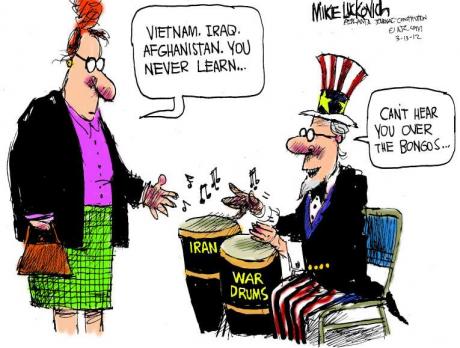
(The better informed everybody becomes the greater the chance that war can be prevented and propaganda can not distort reality. With a couple of clicks you can do your part by simply forwarding this to others.)
____________________________________________________________
Iranian dissidents don’t want war
By Ramin Jahanbegloo and R.N. Khatami
Which would be worse if sanctions and diplomacy fail: the aftermath of an Israeli or U.S. attack on Iran to set back its nuclear program, or the Tehran regime having the bomb?
If you measure the level of public discussion, hands down the worst would be having Iran’s supreme leader, Ayatollah Ali Khamenei, and/or President Mahmoud Ahmadinejad armed with nuclear weapons.
However, within the intelli-gence community and among its retirees there are some ex-perienced analysts who believe that Iran’s leaders with nuclear weapons wouldn’t be much different than they are today, with their first concern being holding on to power, not using a weapon to wipe out Israel and thereby bring about their own destruction.
That approach has been sensibly argued by Paul Pillar, a former senior CIA intelligence analyst and a national intelligence officer for the Near East and South Asia from 2000 to 2005.
“An Iran with a bomb would not be anywhere near as dangerous as most people assume, and a war to try to stop it from acquiring one would be less successful and far more costly than most people imagine,” Pillar writes in the current issue of Washington Monthly.
Pillar, who teaches at Georgetown University, points out that despite all the “belli-cosity and political rhetoric” about the issue, the idea of an Iran with the bomb “has been subjected to precious little careful analysis.”
He cites the repeated stereotyping that Iran’s rulers are “religious fanatics who value martyrdom more than life, cannot be counted on to act rationally and, therefore, cannot be deterred.” Pillar notes that the past 30 years have proved that although they promote martyrdom to defend the homeland, “they have never given any indication of wanting to become martyrs themselves.”
Pillar also questions why the argument that any Israeli/U.S. attack on Iran to set back its nuclear program uses the “best case” scenario that Tehran’s response would be limited, while only a “worst case” analysis is made of Iran getting the bomb. If the armed attack by Israel or the United States is analyzed under “worst case” scenarios, Pillar says, “we would be hearing about a regional conflagration involving multiple U.S. allies, sucking in U.S. forces beyond the initial assault.”
He said such an attack also “would be an immediate political gift to Iranian hard-liners.”
َ






